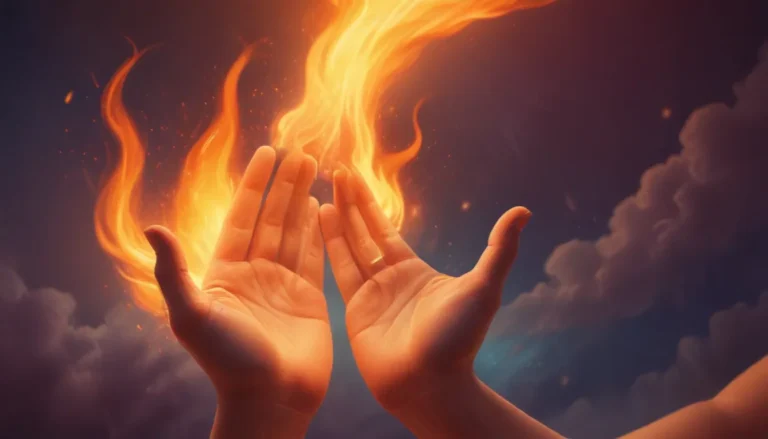
Fire has been a fundamental force throughout human history. It’s more than just a source of warmth and light; fire holds deep spiritual significance in many cultures, traditions, and belief systems around the world. In this comprehensive guide, we will explore the spiritual meaning of fire, its symbolism, and how it affects our lives on both an individual and collective level.
The Elemental Nature of Fire
Fire is one of the four classical elements that make up the universe in many philosophical systems. The other three are Earth, Air, and Water. Each element represents a different aspect of existence: Fire symbolizes passion, action, transformation, and spirit; Earth stands for stability, grounding, and materiality; Air embodies communication, intellect, and adaptability; and Water signifies emotion, intuition, and fluidity.
Fire is often associated with the Sun, which gives life to all living beings on Earth by providing warmth and energy. It’s no wonder that fire plays such a significant role in human culture and spirituality. In many belief systems, the Sun itself is considered a divine entity or even a god.
The Symbolism of Fire
Fire has been a powerful symbol in various religious and cultural traditions for thousands of years. Here are some common symbols and meanings associated with fire:
-
Purification and Transformation: Fire can consume everything in its path, turning it into ashes. In this way, it represents the power of transformation and renewal. In many spiritual practices, fire is used to purify and cleanse one’s energy field or physical space.
-
Passion and Creativity: The intense heat of fire is often associated with passion and creativity. Artists, writers, and other creative individuals may use fire as a metaphor for the intensity and drive that fuels their work.
-
Illumination and Enlightenment: Fire provides light in darkness, which symbolizes knowledge and enlightenment. In some spiritual traditions, fire is used during rituals or ceremonies to guide seekers on their journey toward self-discovery and understanding.
-
Power and Strength: As a force of nature, fire represents raw power and strength. This can be seen in various mythologies where gods and goddesses wield the power of fire as a weapon or symbol of authority.
-
Connection to the Divine: In many cultures, fire is seen as a bridge between the physical world and the spiritual realm. It serves as a medium through which messages can be sent to the divine or ancestors.
Fire in Different Religions and Cultures
Throughout history, different religions and cultures have developed unique ways of incorporating fire into their spiritual practices:
-
Hinduism: In Hinduism, Agni is the god of fire who acts as a messenger between humans and the gods. Fire is used in various rituals and ceremonies to purify and connect with the divine.
-
Christianity: The use of fire in Christianity can be traced back to the story of Pentecost, where tongues of flame appeared above the heads of the apostles. Today, fire is often associated with the Holy Spirit and is used during prayer services and worship ceremonies.
-
Judaism: In Jewish tradition, the Menorah – an ancient symbol that represents the divine presence – is a seven-branched candelabrum with flames representing the light of God. Fire plays a significant role in Jewish rituals such as Passover and Hanukkah.
-
Islam: Fire is mentioned numerous times in the Qur’an, often symbolizing judgment and purification. In Islamic architecture, fire is used to represent the divine presence, especially in mosques where candles or lamps are lit during prayer.
-
Native American Traditions: For many Native American tribes, fire holds great spiritual significance. It was considered a gift from the Creator, providing warmth, light, and sustenance. In various ceremonies and rituals, fire is used to honor the spirits and ancestors.
-
African Traditional Religions: Fire is an essential element in many African traditional religions, representing purification, transformation, and the divine presence. In some cultures, bonfires are lit during spiritual ceremonies or at crossroads to ward off evil spirits.
Practical Applications of Fire in Spiritual Life
Fire has numerous practical applications within spiritual practices:
-
Meditation: Many practitioners use fire as a focal point during meditation, helping them maintain focus and concentrate on their breathing or mantra. The flickering flames can also induce a sense of calmness and tranquility.
-
Healing: In various spiritual healing traditions, fire is used to cleanse the body’s energy field and promote physical and emotional well-being. This may involve passing over the patient’s body with a flame or using heated stones.
-
Rituals and Ceremonies: Fire plays a central role in many rituals and ceremonies across different cultures and belief systems. It serves as a medium through which prayers, offerings, and intentions are sent to the divine.
-
Transformation and Rebirth: Fire is often used during spiritual practices aimed at transformation and rebirth. This might involve burning away negative energy or beliefs that no longer serve us, allowing us to start fresh and embrace new possibilities.
Conclusion
The spiritual meaning of fire has been deeply ingrained in human culture for thousands of years. As an elemental force with powerful symbolism, fire has played a significant role in shaping our understanding of the world around us and our place within it. By exploring the various ways that fire is used in different religions and cultures, as well as its practical applications within spiritual practices, we can gain a deeper appreciation for this fascinating aspect of human experience.





